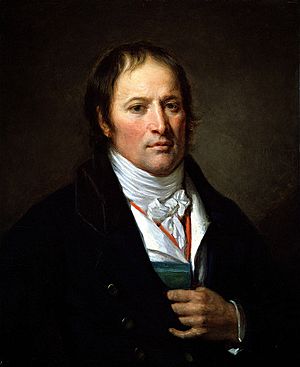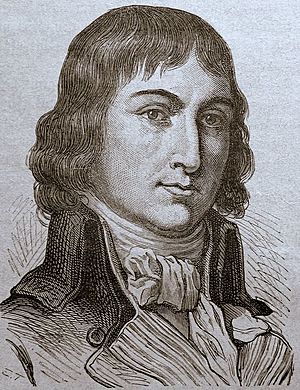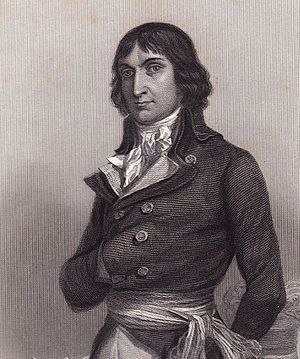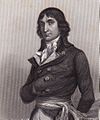Jacques-Nicolas Billaud-Varenne facts for kids
Quick facts for kids
Jacques-Nicolas Billaud-Varenne
|
|
|---|---|

Billaud-Varenne, around 1790 (Dallas Museum of Art)
|
|
| 3rd President of the Committee of Public Safety | |
| In office 31 July 1794 – 1 September 1794 |
|
| Preceded by | Maximilien Robespierre |
| Succeeded by | Merlin de Douai |
| 25th President of the National Convention | |
| In office 5 September 1793 – 19 September 1793 |
|
| Preceded by | Maximilien Robespierre |
| Succeeded by | Pierre Joseph Cambon |
| Member of the National Convention | |
| In office 7 September 1792 – 26 October 1795 |
|
| Constituency | Seine |
| Member of the Committee of Public Safety | |
| In office 6 September 1793 – 1 September 1794 |
|
| Personal details | |
| Born |
Jacques Nicolas Billaud
23 April 1756 La Rochelle, Kingdom of France |
| Died | 3 June 1819 (aged 63) Port-au-Prince, Haiti |
| Political party | The Mountain |
| Spouse | Anne-Angélique Doye |
| Alma mater | University of Poitiers |
| Occupation | Lawyer, politician |
| Nickname | "The Tiger" |
Jacques-Nicolas Billaud-Varenne (born April 23, 1756 – died June 3, 1819) was an important figure during the French Revolution. He was also known as Jean Nicolas or "the Righteous Patriot."
Billaud-Varenne played a key role in a period called the Reign of Terror. During this time, he became a very strong member of the Committee of Public Safety. He worked with famous French Revolution leaders like Georges Danton and Maximilien Robespierre. Many people see him as one of the main people behind the Terror.
Even though he was friends with Robespierre, Billaud-Varenne helped cause Robespierre's downfall. This happened on July 27, 1794 (known as 9 Thermidor). The reasons for this are still debated, but it might have been about how much power the government should have. Billaud-Varenne seemed to want less central control. He later said he regretted his actions.
After Robespierre's fall, Billaud-Varenne was arrested. He was sent away to Cayenne in French Guiana without a trial. He refused a pardon from Napoleon and later died in Port-au-Prince, Haiti, in 1819.
Contents
Life Story
Early Years
Jacques-Nicolas Billaud-Varenne was born in La Rochelle, France. His father and grandfather were both lawyers. This meant he was expected to get a good education and become a lawyer too.
He went to school at the College of Oratorians in Niort. This school was special because it taught modern ideas and tolerance. This was different from many other schools at the time, which focused more on strict religious teaching. He also studied philosophy.
Later, Billaud-Varenne became a professor at another Oratory school called Juilly. He left this job in 1785 after a play he wrote caused problems with the school leaders. He then moved to Paris, got married, and became a lawyer.
In 1789, he published a book about the "Despotism of the ministers of France." He also wrote a popular book against the Church. As the French Revolution began, he strongly supported its ideas.
Getting Involved in Politics
Billaud-Varenne joined the Jacobin Club, a powerful political group. From 1790, he became a strong speaker against the King. He was close friends with Jean-Marie Collot d'Herbois.
After King Louis XVI tried to escape France, Billaud-Varenne wrote a pamphlet. In it, he called for a "power without a head," meaning a republic without a king.
On July 1, he spoke at the Jacobin Club, asking for a republic. People who supported a king with limited power made fun of him. But when he repeated his demand two weeks later, his speech was printed and sent to Jacobin groups across France.
On August 10, 1792, during an attack on the royal palace, he met with other leaders. He was then chosen as a leader for the Paris Commune. Some people believed he was involved in the September Massacres, a series of killings in prisons.
Work in the National Convention
Billaud-Varenne was elected to the National Convention, like Robespierre and Danton. He quickly spoke out for ending the monarchy right away. He also suggested that all official documents should be dated from "Year I of the French Republic."
When King Louis XVI was put on trial, Billaud-Varenne added new charges. He voted for the King to be executed within 24 hours. In June 1793, he suggested a plan for the Convention to follow. This included removing foreigners, taxing the rich, and watching all military officers. He also wanted the death penalty for generals who failed in battle.
His Role in the Reign of Terror
In August 1793, Billaud-Varenne was sent to northern France. He was very strict with anyone suspected of being against the Revolution.
When he returned, the people of Paris were upset about the problems facing France. On September 5, a large group marched to the National Convention. Billaud-Varenne was one of the main speakers calling for changes in leadership. He asked for a new war plan and a new committee to oversee the government.
To calm the crowd, Billaud-Varenne was made President of the National Convention for two weeks. The next day, he was named to the Committee of Public Safety. He and Collot d'Herbois were added to the Committee to gain the support of the Paris Commune.
Once on the Committee, Billaud-Varenne strongly defended it. He helped create the rules and strengthen the Committee's power. In December, he suggested a law to centralize authority, known as the Law of 14 Frimaire. This law gave the Committee control over many aspects of government.
He also defended the Terror. In November 1793, a law was passed giving accused people the right to defend themselves. Billaud-Varenne argued against this, saying, "No, we will not step backward, our zeal will only be smothered in the tomb; either the revolution will triumph or we will all die." The law was overturned the next day.
Downfall and Exile
As 1794 went on, Robespierre began to criticize some members of the Revolution. He thought people like Billaud-Varenne and Collot d'Herbois were too extreme. Robespierre believed their actions, like attacking Church property, were dangerous.
A new law, the Law of 22 Prairial, greatly reduced the right to defense in court. It also expanded the list of crimes punishable by death. This led to a period called the Great Terror, where many more people were executed. Although Billaud-Varenne publicly supported this law, it caused serious arguments within the Committee.
Billaud-Varenne and Collot d'Herbois began to fear for their safety. On June 29, an argument broke out between Committee members. Billaud-Varenne called Robespierre a dictator. Robespierre then left the Committee meetings. With more people being executed each day, Billaud-Varenne and Collot d'Herbois became very worried.
On July 26, 1794 (8 Thermidor), Robespierre gave a speech to the Convention. He spoke of "monsters" threatening the Republic but did not name them. This worried many members. That night, Robespierre gave the same speech to the Jacobin Club. Collot d'Herbois and Billaud-Varenne tried to defend themselves but were shouted down and kicked out of the club.
The next day, July 27 (9 Thermidor), Billaud-Varenne played a key role in the final move against Robespierre. As Robespierre's ally, Saint-Just, began to speak, he was interrupted. Billaud-Varenne then spoke, directly accusing Robespierre of plotting against the Republic. This speech was well-received. Arrest warrants were issued for Robespierre and his allies. They were executed the next day.
However, Billaud-Varenne's freedom did not last long. He was too closely linked to the extreme actions of the Reign of Terror. He was soon arrested himself. In April 1795, the Convention ordered him to be sent to French Guiana. He went there with Collot d'Herbois and Bertrand Barère. In Guiana, he became a farmer and married a formerly enslaved woman.
After Napoleon Bonaparte took power, Billaud-Varenne refused a pardon. In 1816, he left Guiana and went to New York City for a few months. He then moved to Port-au-Prince, Haiti. There, he became an advisor to the high court.
The President of Haiti, Alexandre Pétion, gave him a pension until he died. Billaud-Varenne died in Port-au-Prince in 1819. Among his last words, he said: "My bones, at least, will rest on a land that wants Liberty."
Writings
- Despotism of the ministers of France, combatted by the rights of the Nation, by the fundamental laws, by the ordinances…, Paris, 1789.
- Memoirs written in Port-au-Prince in 1818, containing the relation of his voyages and adventures in Mexico, from 1815 to 1817, Paris, 1821 [likely not written by him].
- Billaud Varenne, member of the Committee of Public Safety: Unpublished memoirs and correspondence. Accompanied by biographical notes on Billaud Varenne and Collot d'Herbois, Paris, 1893.
Images for kids
-
Billaud-Varenne portrayed by Jean-Baptiste Greuze, around 1790
See also
 In Spanish: Jacques Nicolas Billaud-Varenne para niños
In Spanish: Jacques Nicolas Billaud-Varenne para niños
 | Aurelia Browder |
 | Nannie Helen Burroughs |
 | Michelle Alexander |







